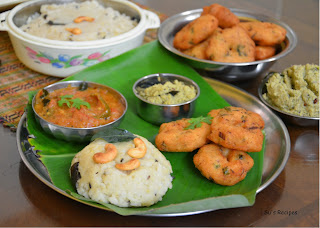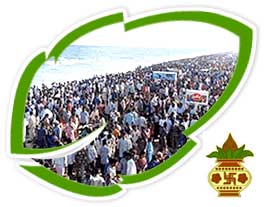Thai Pongal(தைப்பொங்கல்)
Thai Pongal (தைப்பொங்கல்) or Pongal (பொங்கல்) is a harvest festival celebrated by Tamils at the end of the harvest season. It is one of the most important festivals celebrated by the Tamils in the Indian state of Tamil Nadu, the Indian Union Territory of Puducherry and Sri Lanka.
History
The history may well be more than 1000 years old although some are of the view that the festival is older than that. Epigraphic Evidence suggests the celebration of the Puthiyeedu during the Medieval Chola empire days. It is thought that Puthiyeedu meant the first harvest of the year.The link between that fast and today's harvest festival needs to be further researched. Tamils refer to Pongal as "Tamizhar Thirunaal" (meaning "the festival of Tamils") Makara Sankranti in turn is referred to in the Surya Siddhanta.
Pongal dish
Besides rice and milk the ingredients of the sweet dish Pongal dish include cardamom, jaggery, raisins, mung dhal, and cashew nuts. Cooking is done in sunlight, usually in a porch or courtyard, as the dish is dedicated to the Sun god, Surya. The cooking is done in a clay pot called kollam which is decorated with coloured patterns. There are two versions of pongal, one sweet the other salted. The prepared dish is served on banana leaves.Apart from Pongal Day celebrations, cooking pongal is a traditional practice at Hindu temples during any Temple Festival in Tamil Nadu. The community will convene to cook pongal rice, partake of it and distribute it to those present.

Maatu Pongal:-
Cattle play an important role in the traditional Indian farmstead be
it with regards to the provision of dairy products, its use for
ploughing and transport and its provision of fertilizer. This explains
the Tamil reference to cattle as wealth. On the day after Pongal, cattle
are felicitated. In rural Tamil Nadu, adventurous games such as the
Jallikkattu or taming the wild bull are features of the day. Maattu
Pongal is intended to demonstrate our recognition and affection to
cattle and decorate them with garlands, apply kungumam (kumkum) on their foreheads and are feed with a mixture of venn pongal, jaggery,honey,banana and other fruits
Kanu Pidi is a tradition that the ladies and young girls of the house
follow. Women feed birds and pray for the well being of their brothers.
Women of the family place different kinds of coloured rice, cooked
vegetables, banana and sweet pongal on a ginger or turmeric leaf and
invite the crows, which descend in hordes to share and enjoy the "Kaka
pidi, Kanu pidi" feast. Women offer prayers in the hope that the
brother-sister ties may remain forever strong like the family of crows.

Kaanum Pongal:-
In Andhra Pradesh, Mukkanuma, the final day of Sankranthi festival, is celebrated to worship cattle. Mukkanuma is famous among the non-vegetarians of the society. People do not eat any non-vegetarian dishes during the first three days of the festival and eat it only on the day of Mukkanuma.

so enjoy

THANKING YOU






No comments:
Post a Comment